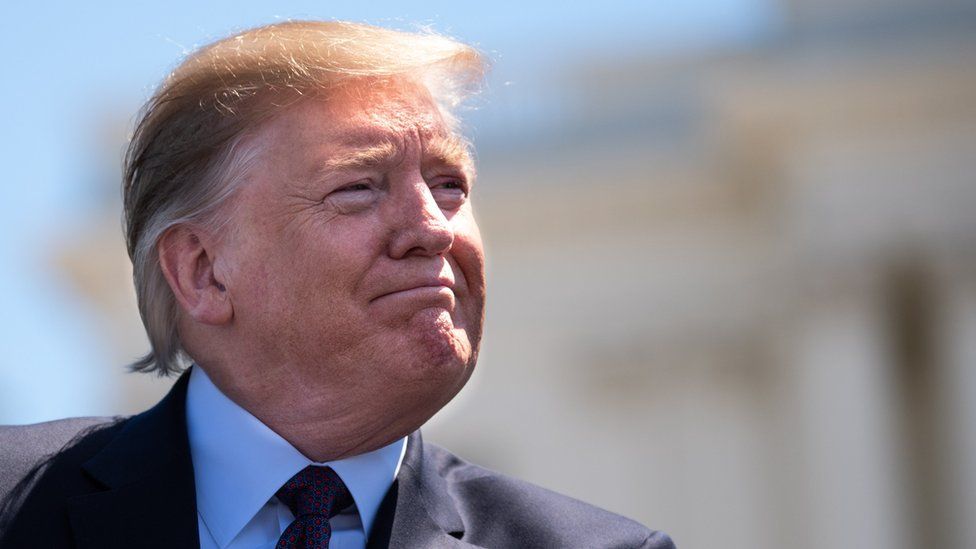Trump declares national emergency over IT threats
- Published

President Donald Trump has declared a national emergency to protect US computer networks from "foreign adversaries".
He signed an executive order which effectively bars US companies from using foreign telecoms believed to pose national security risks.
The order does not name any company, but is believed to target Huawei.
The Chinese tech giant said restricting its business in the US would only hurt American consumers and companies.
We explain the controversy around Huawei's 5G tech – using castles
Several countries, led by the US, have raised concerns in recent months that Huawei products could be used by China for surveillance, allegations the company has vehemently denied.
The US has been pressuring allies to shun Huawei in their next generation 5G mobile networks.
In a separate development, the US commerce department added Huawei to its "entity list", a move that bans the company from acquiring technology from US firms without government approval.
The moves are likely to worsen tensions between the US and China, which had already escalated this week with tariff hikes in a trade war.
Huawei has been at the epicentre of the US-China power struggle that has dominated global politics over the past year.
What does the order say?
According to a White House statement, Mr Trump's order aims to "protect America from foreign adversaries who are actively and increasingly creating and exploiting vulnerabilities in information and communications technology infrastructure and services".
It gives the secretary of commerce the power to "prohibit transactions posing an unacceptable risk to the national security", the statement adds.
The move was instantly welcomed by Federal Communications Commission Chairman Ajit Pai, who called it "a significant step toward securing America's networks".
The US had already restricted federal agencies from using Huawei products and has encouraged allies to shun them, while Australia and New Zealand have both blocked the use of Huawei gear in 5G networks.
In April 2018 another Chinese tech company, ZTE, was barred from buying US parts after it was placed on the same "entity list". It resumed business after reaching a deal with the US in July.
How has Huawei responded?
Huawei has said its work does not pose any threats and that it is independent from the Chinese government.
"Restricting Huawei from doing business in the US will not make the US more secure or stronger," the company said in a statement.
"Instead, this will only serve to limit the US to inferior yet more expensive alternatives, leaving the US lagging behind in 5G deployment, and eventually harming the interests of US companies and consumers."
The company also said "unreasonable restrictions" on Huawei raised "other serious legal issues".
During a meeting in London on Tuesday, Huawei chairman Liang Hua said it was "willing to sign no-spy agreements with governments" as concerns over the security of its products used in mobile networks continued to grow.
What does the national emergency mean?
By declaring a national emergency President Trump can effectively bypass other branches of government and gains access to a raft of special powers.
The Brennan Center for Justice, a non-partisan public policy institute, has compiled a list of more than 120 legal powers the president can use in such an event - they range from taking over farmland to calling up military reservists or seizing property with few or no restrictions.
President Trump has now declared five national emergencies, including most recently over the southern US border.
A rolling list of national emergencies compiled by the centre shows there are now 33 active national emergencies in the US.
The oldest emergency still in place was signed by President Jimmy Carter in November 1979 as a response to the Iran hostage crisis. Others signed by Presidents Bill Clinton, George W Bush and Barack Obama also remain in effect.
The other US move that could hurt Huawei more
President Trump does not name or single out Huawei in his executive order but the intent is clear: keep the company out of the US. What is more - this comes against the backdrop of an escalating trade war - and will no doubt inflame tensions between the two countries.
Huawei consistently says that if the US bans Huawei from its networks, they are the ones to lose out, not Huawei. That is true. Even without the US market, Huawei is likely to control 40-60% of the networks around the world, industry analysts say.
But what may hurt Huawei more is the US decision to put them on the "entity list" - effectively banning American suppliers from selling to the firm.
Huawei may not need the US market, but it certainly needs the key components that it gets from the US.
What about the trade war?
President Trump has complained about China's trading practices since before taking office in 2017.
The US more than doubled tariffs on $200bn (£154.9bn) of Chinese goods on Friday and China retaliated with its own tariff hikes on US products.
This escalated the situation which only recently seemed to be nearing a conclusion.
However, stock markets steadied on Wednesday as hopes rose that the two countries might resume talks next month as Mr Trump said he expected to meet Chinese President Xi Jinping at the G20 summit in Japan.
China's foreign ministry spokesman Geng Shuang also said that the two men "maintain contact through various means".
- Published18 February 2019
- Published7 March 2019
- Published20 May 2019
- Published22 April 2019